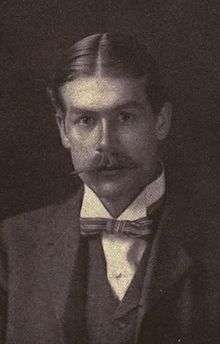Bob Huntington
 | |
| Full name | Robert Palmer Huntington, Jr. |
|---|---|
| Country (sports) |
|
| Born |
January 15, 1869 Louisville, KY |
| Died |
March 12, 1949 (aged 80) Poughkeepsie, NY |
| Singles | |
| Grand Slam Singles results | |
| US Open | SF (1890, 1902) |
| Doubles | |
| Grand Slam Doubles results | |
| US Open | W (1891, 1892) |
Robert Palmer Huntington Jr. (January 15, 1869 in New York – March 12, 1949) was an American tennis player.
Career
In 1891 and 1892 he won the men's doubles title at the U.S. National Championships together with compatriot Oliver Campbell.[1] In the singles tournament he reached the semifinals in 1890, losing to his doubles partner and eventual champion Oliver Campbell, and again more than a decade later in 1902, losing in four sets to Malcolm Whitman. Huntington also reached the quarterfinals in 1899 and 1903.
In 1890 he won the singles title at the New England Championship.
Huntington is a graduate from Yale University (1891) and won the intercollegiate tennis singles title in 1889.[2] He worked as an architect at Hoppin, Koen & Huntington from 1896 until retirement in 1909.[3]
Grand Slam doubles finals
Titles (2)
| Year | Championship | Partner | Opponents | Score |
| 1891 | U.S. Championships | | 6–3, 6–4, 8–6 | |
| 1892 | U.S. Championships | | 6–4, 6–2, 4–6, 6–3 |
Runners-up (1)
| Year | Championship | Partner | Opponents | Score |
| 1893 | U.S. Championships | | 3–6, 4–6, 6–4, 2–6 |
Architectural works
Huntington joined the architectural firm of Francis L.V. Hoppin (1867-1941) and Terence A. Koen (1858-1923) after a period with J.P. Morgan. He became a full partner in 1902, and they practiced together until he retired in 1908. The firm was based in Manhattan, New York and is known for police stations, fire stations and dignified town houses in the Beaux Arts Style. Huntington, who was independently wealthy, owned 300 acres on the Hudson River at Staatsburg, New York where he designed and built his residence, Hopeland House, a thirty-five room Tudor Revival mansion. In addition, he designed his own house in rural Hampton County, South Carolina; his house there at Gravel Hill Plantation, a National Register of Historic Places property, is his only known work south of New York.[4]
External links
References
- ↑ "Campbell and Huntington" (PDF). The New York Times. August 25, 1892. Retrieved May 9, 2012.
- ↑ "History of the Ivy League". Council of Ivy League Presidents. Retrieved May 10, 2012.
- ↑ "Yale University Obituary Record 1948-1949" (PDF). Yale University. January 1, 1950. p. 18. Retrieved May 10, 2012.
- ↑ Bryan, John (November 6, 2009). "National Register of Historic Places nomination form - Gravel Hill Plantation" (PDF). South Carolina Department of Archives and History. Retrieved October 9, 2013.